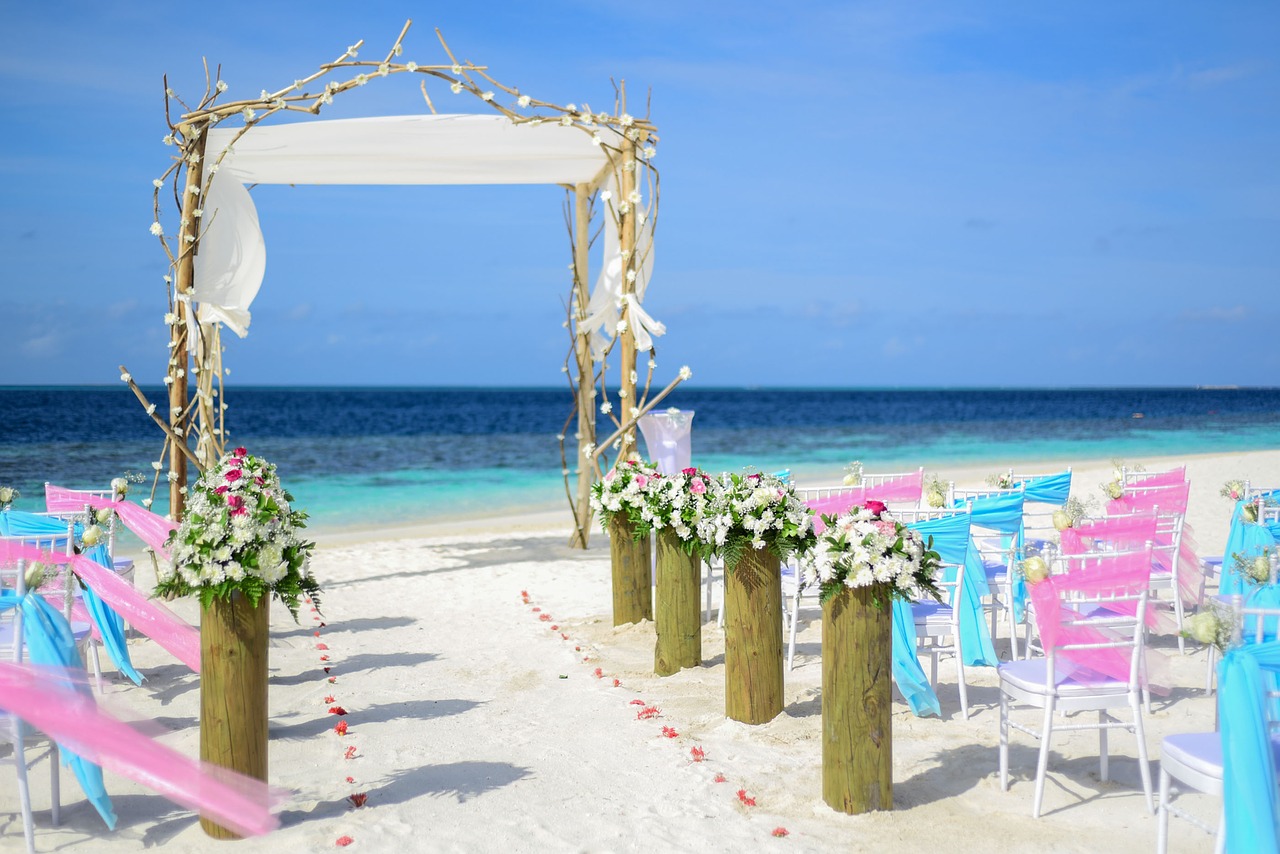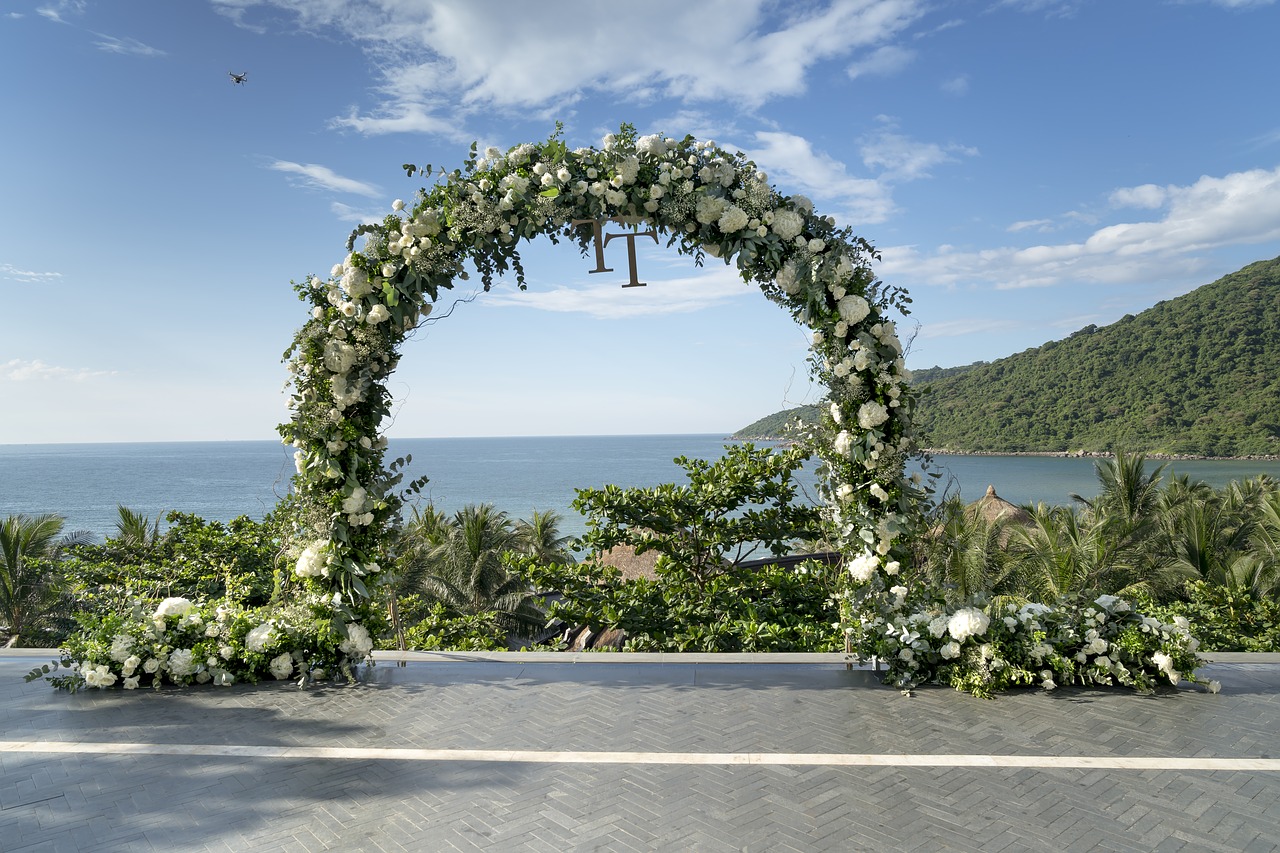Organising a destination wedding is an exciting journey that lets you create beautiful memories in a faraway location.
However, careful planning is required to ensure you and your guests enjoy an unforgettable experience.
From timing invitations to managing logistics, consider the following guide to help you easily plan your dream wedding.
Let’s get straight to the point
Planning a destination wedding involves careful location selection, early invitations, and clear communication with guests to ensure a smooth experience.
Choose a venue with ideal weather, book accommodations early, and review any legal requirements. Send Save-the-Dates eight to twelve months in advance and formal invitations three to four months before the event.
Create a schedule for guest activities, including a welcome party, wedding day, and post-wedding brunch, to balance celebration with relaxation.
Offer group travel discounts and guest welcome packs, and use a wedding website for event details and local tips. Arrange varied accommodation options and transportation to make guests’ logistics easier.
For gift etiquette, consider requesting no gifts or provide a registry link. Prepare for contingencies, like bad weather, and have a sound system ready. Hiring a local wedding planner can help manage unforeseen issues, and creating backup plans ensures a seamless experience.
Thoughtful planning lets you and your guests fully enjoy this special destination celebration.
Choosing The Perfect Destination For Your Wedding

Planning begins with a fundamental question: where should you get married? Your choice of location affects the ambience, guest list, and overall experience. Here are essential considerations for selecting your destination:
- Climate and Season
Choose a season that aligns with the type of wedding you envision. Tourist seasons often mean better weather but also larger crowds and higher prices. Opt for shoulder seasons to save costs, but be prepared for inclement weather. - Venue and Accommodation Availability
Popular destinations book up quickly, so start early. Booking your wedding venue and accommodations in advance ensures you and your guests secure the best rates and availability. - Local Laws and Requirements
Understand any legal requirements for marriage in your chosen location. Some countries have residency requirements, meaning you must arrive days or even weeks in advance. Knowing these details will help prevent last-minute complications.
Inviting Guests: Timing And Etiquette
A destination wedding means guests need ample notice to make travel arrangements. Follow these guidelines for sending invites:
- Save-the-Dates
Send Save-the-Date cards at least eight to twelve months ahead. Early notice allows guests to prepare for time off, make travel plans, and save for expenses. - Formal Invitations
Formal invitations should be sent three to four months in advance. They should include essential information, such as the venue address, nearby accommodation options, and travel tips. - Clear Dress Code and Theme
If your wedding has a particular theme, such as a beach or garden, mention it in your invitation. Setting the tone will help your guests arrive prepared and comfortable.
Planning The Perfect Timeline For Your Wedding Trip
Since your destination wedding doubles as a trip for your guests, create a thoughtful schedule that balances structured events with downtime. Here’s a recommended itinerary:
- Rehearsal Dinner or Welcome Party
Host a welcome event a day or two before the wedding. This casual gathering allows guests to meet each other, helping break the ice and setting a celebratory mood. - Main Wedding Event
Reserve the primary day for your ceremony and reception, providing transportation if needed. Make it memorable by incorporating elements of the local culture, such as traditional music, cuisine, or décor. - Post-Wedding Brunch
A farewell brunch offers a relaxed setting for final goodbyes and provides one last chance to thank your guests personally.
Tips For Couples Hosting A Destination Wedding

Creating a memorable wedding experience requires proactive planning. Here are practical tips to help you navigate the details and ease potential stress:
- Arrange Group Travel Discounts
Many hotels and airlines offer group discounts, which can significantly reduce costs for you and your guests. Discuss your plans with your hotel and airline provider to find discounts or special group rates. - Provide Guest Welcome Packs
Show your appreciation by offering welcome packs upon arrival. The packs should include useful items such as sunscreen, local maps, snacks, and perhaps a schedule of events. - Establish a Wedding Website
A wedding website is invaluable for organising travel details, accommodation options, and event schedules. You can also provide packing lists, dress code suggestions, and local attractions.
Coordinating Travel And Accommodation Options For Guests
Helping guests find convenient and affordable accommodation can make a big difference in their experience. Here are suggestions for easing travel logistics:
- Offer a Range of Accommodation Options
Suggest accommodations for different budgets, from luxury resorts to budget-friendly hotels or vacation rentals. Mention proximity to your wedding venue for easier coordination. - Coordinate with Local Vendors
Book local vendors such as photographers, caterers, and florists well in advance. Consider scheduling tastings, bouquet viewings, and trial runs with vendors to finalise your vision for the day. - Ensure Reliable Transportation
Destination weddings often require some logistical arrangements, like transporting guests between venues. Plan shuttles, taxis, or car services ahead of time, especially if the venue is remote.
Creating Memorable Guest Experiences
Your wedding is the focal point, but it’s also an opportunity for guests to enjoy a getaway. Here are ways to make their experience even more special:
- Host Group Activities
Plan optional activities like a guided tour, beach day, or local dining experience. These events create lasting memories and allow guests to relax and enjoy the destination. - Provide a Travel Guide
Include a travel guide on your wedding website or offer printed versions in the welcome packs. Highlight local attractions, must-see sights, and cultural tips. - Offer Childcare Options if Needed
If your wedding is adult-only, help parents by providing information on local childcare services. This will allow parents to enjoy the event while ensuring their children are cared for.
Handling Gift Etiquette And Expectations
Guests often wonder about gift-giving etiquette for destination weddings. Simplify the process with these recommendations:
- Request No Gifts
Given the travel expenses guests incur, requesting no gifts is considerate. Many couples opt for a note in the invitation, such as “Your presence is the best gift we could ask for!” - Alternative Gift Options
If you prefer to receive gifts, consider a registry or cash fund. This is a practical choice for couples prioritising experiences, such as honeymoon activities, over traditional gifts. - Provide Shipping Information
If guests insist on giving gifts, include your home address or an online registry with shipping options. This prevents guests from having to transport items to the wedding destination.
Preparing For The Unexpected: Backup Plans And Contingencies
Destination weddings add a layer of unpredictability, so it’s wise to have backup options:
- Prepare for Weather Changes
Secure a backup indoor venue or rental tents, especially for outdoor weddings. Discuss weather-related plans with your venue coordinator to ensure you have options if conditions change. - Have a Sound System Ready
If your ceremony is outdoors, consider the impact of ambient noise, such as waves or wind. Set up lapel microphones for vows and a quality sound system for music. - Coordinate with a Local Planner
Hiring a local wedding planner can alleviate stress. They are familiar with the area, know reliable vendors, and can effectively handle last-minute issues.
Conclusion
Planning a destination wedding can be a beautiful journey when approached thoughtfully. Remember to:
- PPrioritiseclear communication with guests about travel, accommodations, and gift expectations.
- Take the time to enjoy the unique experience and embrace the local culture.
- Relinquish some control by enlisting help from a planner, friends, or family members.
By following these steps, you’ll be well on your way to creating a wedding experience you and your guests will cherish forever. Whether exchanging vows on a beach, in a historic city, or among the mountains, thoughtful planning ensures that your special day unfolds seamlessly.

